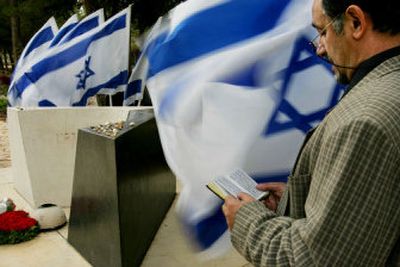Israelis still debate Rabin’s legacy

JERUSALEM – Family and friends lit candles and laid wreaths at Prime Minister Yitzhak Rabin’s grave Friday to begin a week of commemorations marking the 10th anniversary of the former leader’s assassination.
The anniversary has reopened old wounds and brought about new soul-searching in a country that remains deeply divided about Rabin’s legacy and the prospects for peace with the Palestinians. In his first interview since the assassination, the man in charge of Rabin’s security the night he was killed called for a new inquiry into the killing, saying key questions remain unanswered.
Rabin, who negotiated the historic 1993 Oslo peace accords with the Palestinians, was assassinated Nov. 4, 1995, by Yigal Amir, an ultranationalist Jew who considered Rabin a traitor. Amir is serving a life sentence.
While dozens of Israelis flocked Friday to the square in Tel Aviv where Rabin was gunned down following a peace rally, mourners in Jerusalem gathered at his grave.
“What he started will never be forgotten, and we shall continue to act in the same way until we shall achieve the most noble goal of our life, and that is peace among ourselves and our neighbors,” said Shimon Peres, Israel’s vice premier, who shared the Nobel Peace Prize with Rabin and Yasser Arafat for forging the interim peace accord.
Friday’s evening newscasts were dominated by discussions about Rabin’s legacy.
“Time deepens the sense of loss and deepens the significance of the murder. But to say that I’m starting to understand it would be a stretch,” Rabin’s daughter, Dalia Rabin-Pelossof, told Israel TV.
Former President Bill Clinton said the Mideast would be a far different place if Rabin was still alive.
“I believe if he would not have been assassinated there would have been a comprehensive peace deal. Both Israelis and Palestinians would have been working together,” Clinton told Channel Two television. “By this time, we would have been in a different Middle East, more prosperity and less violence.”
Many mourners fretted about the divisions that still exist in Israel and the possibility of more political killings.
“When he was murdered, I felt like someone who lost his father,” said Nachum Lev, who came to pay his respects. “When we see everything that is going on today, the division among our population, I’m afraid we have a lot of work to do in order to prevent such cases in the future.”
Before last month’s pullout from the Gaza Strip, Prime Minister Ariel Sharon – a vocal opponent of Rabin at the time of the killing – was surrounded by heavy security because of widespread threats and incitement against him. Ultranationalist Israelis strongly opposed the pullout.
Amir has never expressed remorse and remains something of a hero among the extremist fringe. The anniversary has given new life to long-simmering conspiracy theories among extremists that Amir did not act alone, and perhaps even was assisted by Israeli security personnel.
Dror Yitzhaki, the official responsible for Rabin’s security the night of the assassination, brushed off such conspiracy theories. But in his first interview since the killing, he called for a new inquiry into intelligence and security failures leading up to the incident.
Yitzhaki, who headed the Shin Bet internal security service’s bodyguard unit, noted that none of Rabin’s guards fired at the killer. Amir was arrested on the spot.
“The security guards … had been trained for years … that the second bullet, if not the first, would be theirs,” Yitzhaki, who resigned after the killing, told Channel Two television.
Yitzhaki also said a sergeant in an intelligence unit overheard a conversation in a public restroom about a “little Yemenite guy” who had a gun and had serious intentions to kill Rabin. But that information was never passed along, he said. Amir’s family traces their roots to Yemen.
The Rabin commemorations also have rekindled debate about Rabin’s legacy. Some argue that Amir radically changed the course of peacemaking.
Six months after the murder, the dovish Peres lost an election to Likud hard-liner Benjamin Netanyahu, who in turn was defeated by Rabin protege Ehud Barak. Neither could drive peace forward, and in late 2000, a new Palestinian uprising erupted. More than 1,000 Israelis and 3,500 Palestinians have since died, though the bloodshed has slowed since a truce was forged in February.
Others say the peace process would have run aground anyway, because the Oslo deal didn’t address contentious issues such as conflicting claims to Jerusalem and the fate of West Bank Jewish settlements. The Palestinians claim the West Bank and Gaza for an independent state, with east Jerusalem as its capital.
Today, Israelis today are less riven over land concessions than in 1995. The Gaza pullout met less resistance than feared, and polls show most Israelis supporting the idea of a Palestinian state.